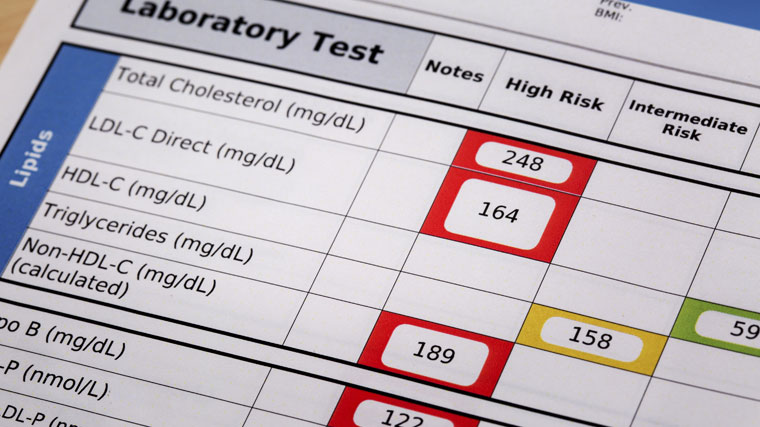- Cardiology And Vascular Health
- Health Topics
- Heart And Vascular Disease Prevention
- Heart Disease Risk Factors
- Heart Health
Lifestyle Choices Can Have Big Effect On Cholesterol Numbers

Knowing your cholesterol numbers is an important part of staying heart healthy.
Starting at age 20, all adults should have their cholesterol checked – along with other risk factors of heart disease – at least every four to six years, according to the American Heart Association.
The results of a complete fasting lipoprotein profile will give you the following details about your cholesterol:
- Total blood cholesterol. This score is found by adding your HDL level, LDL level, and 20 percent of your triglyceride level.
- HDL (good) cholesterol. The higher the levels the better with this type of cholesterol. Having low HDL puts you at a higher risk for heart disease.
- LDL (bad) cholesterol. You need a low LDL cholesterol level for your heart health to be considered good.
- Triglycerides. Normal triglyceride levels vary depending on your age and gender.
High triglycerides combined with low HDL or high LDL, can be a sign of atherosclerosis – a buildup of fat in the artery walls that increases the risk of heart attack and stroke.
There are a variety of factors that affect cholesterol levels and can add to an increased risk of heart disease. Those factors include:
- Age. As you age, cholesterol levels start to rise.
- Diet. Eating foods high in saturated fats and cholesterol will cause your blood cholesterol level to rise.
- Exercise. Regular physical activity helps to lower LDL and raise HDL.
- Gender. Before menopause, women have lower total cholesterol than men at the same age. After menopause, LDL cholesterol rises in women.
- Heredity. Genes also play a part in how much cholesterol the body makes. High cholesterol can run in families.
- Weight. Being overweight is a risk factor for heart disease because it usually increases your cholesterol. Losing weight can lower your LDL and raise your HDL.
Though some things are out of your control – like your age or heredity, you can control how your lifestyle affects your cholesterol.
The National Institutes of Health recommends making Therapeutic Lifestyle Changes (TLC) to help lower your cholesterol. TLC includes the following:
- Exercise. Being physically active at least 30 minutes most days
- TLC diet plan. This diet is low in saturated fats and cholesterol. It encourages choosing fruits, vegetables, whole grains, low-fat dairy, and lean meats.
- Weight management. Losing weight can help to lower LDL if you are overweight.
- Drug treatment. Sometimes, taking medication to lower your cholesterol is needed along with lifestyle changes. However, making lifestyle changes, too, can help keep medication doses low.
If you have high cholesterol, it’s important to talk to your doctor first about what might be the best steps for you to take to help lower it.
Sources: American Heart Association; National Institutes of Health




